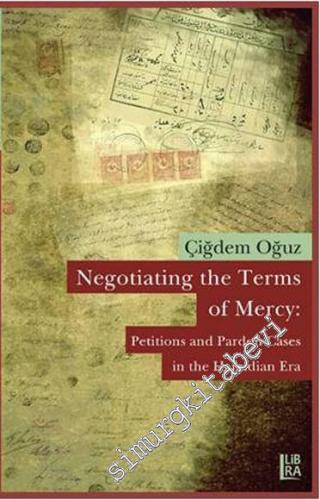#smrgKİTABEVİ Negotiating the Terms of Mercy: Petitions and Pardon Cases in the Hamidian Era -

İçindekiler
ACKNOWLEDGEMENTS
CONTENTS
CHAPTER ONE
INTRODUCTION
CHAPTER TWO
THE PARDON PETITIONS: THE STORIES AND AUTHORS
Petitions as Artifacts
The Process of Supplication
The Authors of the Petitions
The Stories in the Petitions
CHAPTER THREE
DOCUMENTS IN CONTEXT
The Armenian Events, Convicts and Hamidian Policy toward Armenians
The Faces of Hamidian Rule: Legitimacy, Autocracy and Symbolism
Judicial Developments of the Hamidian Era
Tribes and Hamidian Policy
Brigands and State
CHAPTER FOUR
STATE POLICY OF PARDONS AND NEGOTIATION THROUGH SUPPLICATION
The Policy of Pardons
Pardons for Death Penalties
Pardons on Ceremonial Days
Brigands and Pardons
Political Crimes, the Armenian Events and Pardons
Armenian Bandits/Committees and Pardons
Pardons in the Borders
Negotiation Through Supplication
After Being Pardoned
Young Turks and Pardons
CHAPTER FIVE
CONCLUSION
BIBLIOGRAPHY
ÇİĞDEM OĞUZ is a PhD candidate and research assistant at Boğaziçi University, Atatürk Institute of Modern Turkish History. She received her BA degree from Middle East Technical University History Department, and her MA degree from Boğaziçi University, Atatürk Institute. Her research interests focus on the late Ottoman social history and early Turkish Republic.
İçindekiler
ACKNOWLEDGEMENTS
CONTENTS
CHAPTER ONE
INTRODUCTION
CHAPTER TWO
THE PARDON PETITIONS: THE STORIES AND AUTHORS
Petitions as Artifacts
The Process of Supplication
The Authors of the Petitions
The Stories in the Petitions
CHAPTER THREE
DOCUMENTS IN CONTEXT
The Armenian Events, Convicts and Hamidian Policy toward Armenians
The Faces of Hamidian Rule: Legitimacy, Autocracy and Symbolism
Judicial Developments of the Hamidian Era
Tribes and Hamidian Policy
Brigands and State
CHAPTER FOUR
STATE POLICY OF PARDONS AND NEGOTIATION THROUGH SUPPLICATION
The Policy of Pardons
Pardons for Death Penalties
Pardons on Ceremonial Days
Brigands and Pardons
Political Crimes, the Armenian Events and Pardons
Armenian Bandits/Committees and Pardons
Pardons in the Borders
Negotiation Through Supplication
After Being Pardoned
Young Turks and Pardons
CHAPTER FIVE
CONCLUSION
BIBLIOGRAPHY
ÇİĞDEM OĞUZ is a PhD candidate and research assistant at Boğaziçi University, Atatürk Institute of Modern Turkish History. She received her BA degree from Middle East Technical University History Department, and her MA degree from Boğaziçi University, Atatürk Institute. Her research interests focus on the late Ottoman social history and early Turkish Republic.






















